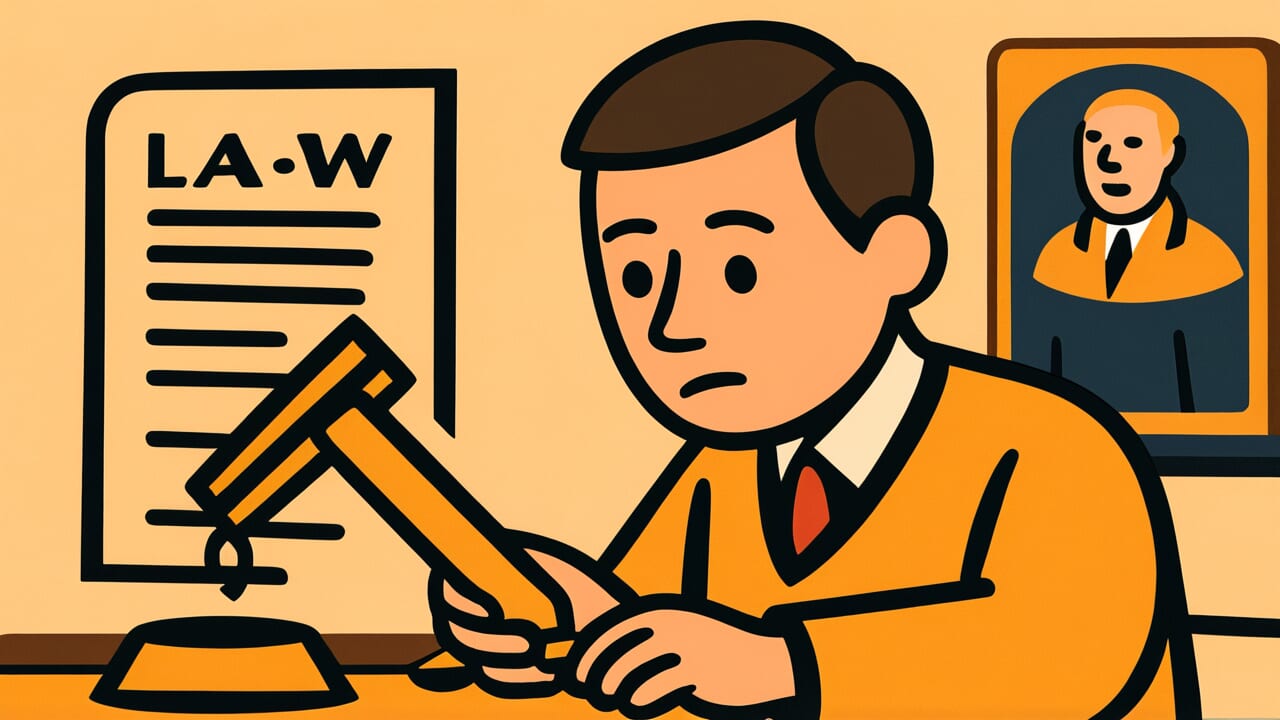How to Read “Even a bad law is still a law”
Akuhō mo mata hō nari
Meaning of “Even a bad law is still a law”
This proverb means you must follow a law even if it seems unfair or unreasonable. As long as it’s an official law, you have to obey it.
In a country ruled by law, people can’t just ignore laws they don’t like. Even if a law hurts you personally, you still have a duty to follow it.
People use this saying when they question a law but want to stress how important it is to keep order. If everyone chose which laws to follow, society would fall apart.
Today, people use it to explain the rule of law. They also use it when they must follow rules they don’t agree with.
But the saying also hints at something important. Bad laws should be changed through democratic processes. Following the law and working to improve it should happen together.
Origin and Etymology
This proverb connects to the death of Socrates, an ancient Greek philosopher. In 399 BC, he was sentenced to death for disrespecting the gods and corrupting young people.
His students urged him to escape from prison. But Socrates said words that meant “even a bad law is still a law.” Then he drank poison and accepted his punishment.
However, there’s no solid record of Socrates actually saying these exact words. Plato’s writings about Socrates don’t include this phrase.
Most likely, later people interpreted Socrates’ actions and thoughts. They turned his example into this saying. In Japan, it spread after the Meiji era when Western philosophy was introduced.
As the concept of rule of law developed, these words became important. People used them to explain why following the law matters, even when the law seems wrong.
At the same time, the saying also warns us. It shows the limits of law and reminds us that bad laws need to be changed.
Usage Examples
- I think parking fines are too expensive, but even a bad law is still a law, so I have to pay it.
- I don’t agree with all the school rules, but my teacher has a point when he says even a bad law is still a law and we should follow it.
Universal Wisdom
The proverb “even a bad law is still a law” shows a difficult problem in human society. It’s about the conflict between order and justice.
We all want justice. But we also face the reality that society can’t exist without order.
This saying has lasted so long because it touches on a basic problem. This problem exists whenever people live together in groups.
Perfect laws don’t exist. Any law will feel unfair to someone. But if everyone decides “this law is unfair” and stops following it, society becomes chaotic.
The proverb shows deep understanding of human nature. People are emotional. We naturally want to resist rules that hurt us.
But if we think rationally, we can see the value of stability and safety that rules provide. This saying teaches us to choose reason over emotion in this conflict.
What’s more important is this: the proverb doesn’t just tell us to blindly obey. It teaches that mature citizens follow bad laws while working to change them.
Don’t destroy the law. Instead, seek change within the legal system. This is wisdom humanity has learned through long history.
When AI Hears This
The question of whether to follow bad laws has the same structure as the prisoner’s dilemma in game theory.
If each person decides “I can break this bad law,” they gain a short-term advantage. For example, if you ignore an unreasonable rule, you alone get to act freely.
But if everyone makes the same choice, the entire legal system collapses. Nobody follows any laws, and chaos results. This is like both prisoners choosing to betray each other and getting the worst outcome.
What’s interesting is that a Nash equilibrium forms here. A Nash equilibrium is a state where nobody wants to change their choice, given what others are choosing.
In a society where most people follow even bad laws, breaking the law alone carries high risk of arrest. Following it becomes the rational choice.
In a society where most people break the law, enforcement becomes weak. Breaking it becomes the rational choice. So obedience to bad laws is an equilibrium point stabilized by society’s collective choice.
Mathematically, multiple equilibrium patterns can exist. Both “everyone follows” and “everyone breaks” are theoretically possible equilibriums.
Socrates’ words can be seen as a strategic choice to keep society in the first equilibrium. He chose to follow even bad laws to prevent one violation from causing a chain reaction to the bad equilibrium.
This wasn’t about personal gain or loss. It was advanced strategic thinking that prioritized the stability of the entire system.
Lessons for Today
This proverb teaches us to act constructively even when we’re unhappy. We live with many rules every day: workplace policies, school rules, and social laws.
Some of them we can’t accept.
But the proverb teaches us not to ignore or rebel against rules just because we don’t like them. Instead, follow them while working through proper channels to change them. This is the mature approach.
If your company has an unreasonable rule, suggest changes to your boss. If you question a school rule, discuss it in student council. If a social law has problems, show your opinion through elections.
The key is balance: maintain order while seeking improvement. Destruction is easy, but constructive change requires patience and wisdom.
If you feel a rule is unfair right now, try to find the proper way to change it. Follow it while changing it—this combination is what creates a better society.



Comments